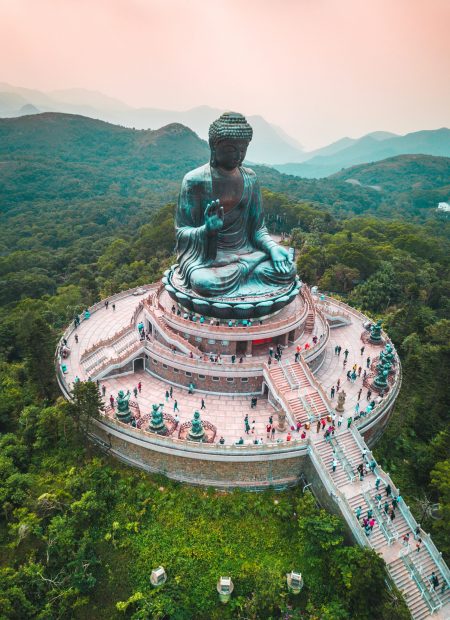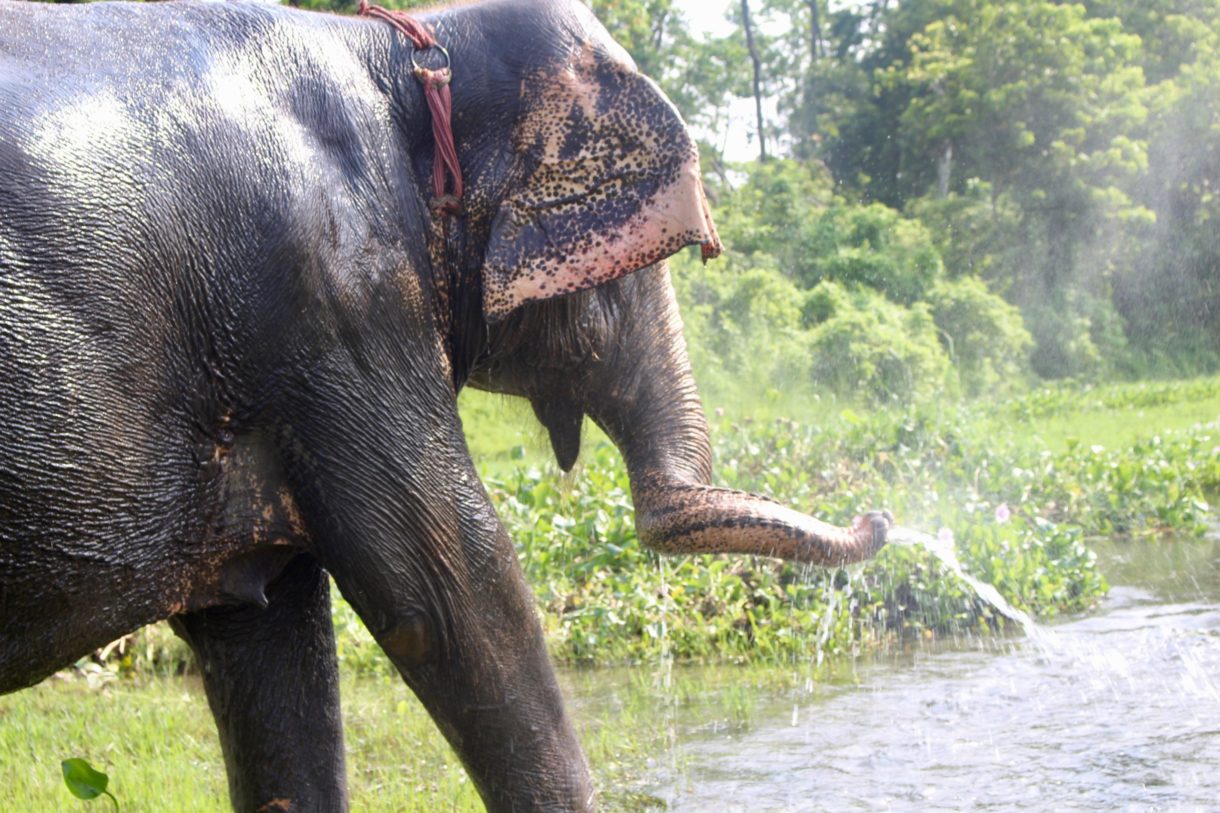
How to be an Elephant-Friendly Tourist in Nepal [2023 Update]
Interacting with elephants is high on the bucket-list of many travellers visiting Asia, yet elephant treatment in the name of tourism is questionable. Ethically-minded travellers may find themselves confused and uncertain about how they can see elephants up close without contributing to their mistreatment. This guide contains all you need to know about being an elephant-friendly tourist in Nepal.
Dive right in to learn how YOU can be an Elephant-Friendly Tourist in Nepal...
Click any of the bullets below to be taken straight to that section
Where is Chitwan National Park?
Chitwan National Park lies in the Terai Region of southern Nepal. This UNESCO World Heritage–listed reserve protects more than 900 square kilometres of forests, marshland and grassland. Chitwan is well known for for its plant and animal biodiversity. One of the jewels of Nepal, this beautiful jungle is home to Asian Elephants, One-Horned Rhinos and the rare Bengal Tiger.
During our time in Nepal, we took a detour to Sauraha, Chitwan to relax for a few more days after our time in Pokhara before heading back to busy Kathmandu. We ate delicious food and saw a wild rhino. We also drove along roads wet with monsoon rain while the wind sent sticky waves of heat across our skin. But most importantly, we educated ourselves on the ethical plight of Asian elephants and how travellers can make a positive change to their treatment.
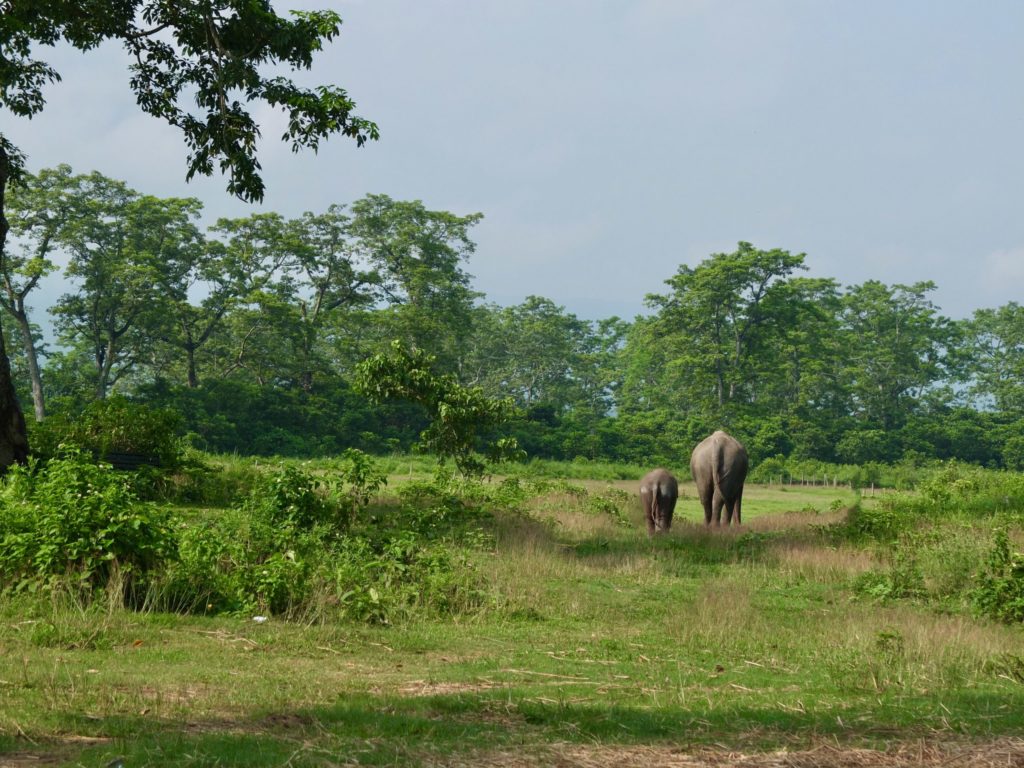
Elephants in Nepal: what's going on?
Elephant tourism is a topic that triggers large amounts of debate. Many international travellers are learning about the abusive and inhumane practices involved in training and subduing such large and magnificent creatures. This leads to tourists turning away from activities involving elephants.
However, dismissing elephant-based tourism as purely problematic ignores the fact that Nepal is getting many things right. The Nepalese people have an intertwined and harmonious relationship with elephants which goes back hundreds of years. Elephants in Nepal are highly respected and have had positive effects on the National Park. These include responsibility for the conservation of rare species in Chitwan and rescue of tourists from floods.
But does this mean it’s ok to ride an elephant? Should you engage in elephant tourism at all?
I will assume, that by researching elephant-friendly tourism, you are already familiar with the inhumane treatment of elephants in many countries. I will therefore not go into graphic detail here of the training and submission elephants must go through where they have their spirits ‘broken’ to submit to humans and will, instead discuss the role of elephants in Chitwan and what you, as a tourist, can do to improve this situation.
Government VS Privately Owned Elephants
Government Owned Elephants
The Nepalese government uses their elephants solely for anti-poaching purposes as they allow park rangers to penetrate deep into the forest where they could not reach safely by foot. Nepal has had several years of zero poaching since elephant patrols were introduced. They have successfully reintroduced the rare one-horned rhino and Bengal tiger, and they are one of the only countries in the world seeing a rise in these populations. These anti-poaching methods also protect the wild population of Asian elephants in Chitwan. Once a rare sight, wild rhino are becoming increasingly common in Chitwan, including in the town of Sauraha!
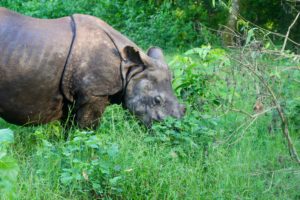
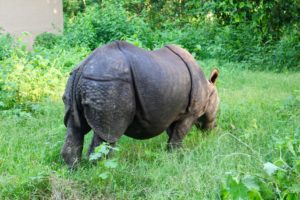
A Rhino we saw in Sauraha village!
The government-owned elephants in Chitwan also have an enclosure where they can roam chain free when not on duty. Although this is a positive step, the government have also been reported to be most resistant amongst all elephant owners to adopting new methods for training in a humane way. We chose not to visit the Government Breeding Centre having read reviews that they were not always engaging in ethical and humane practices.
No system is perfect, but the population of endangered species is on the rise in Nepal, and that’s a conservation win for the entire world. Without the use of anti-poaching elephants this would not have been the case, however the domestication of one wild animal to save others is ethically ambiguous.
What’s not ethically ambiguous, however, is the use and treatment of privately-owned elephants for tourism…
Privately Owned Elephants
Privately-owned elephants are used solely for tourism and this gets a lot of criticism. But Nepal are making radical changes to improve their welfare. There’s a limit to the number of rides elephants can give each day and elephants can no longer be chained up during working hours. Nepal has also banned the use of metal sticks and bull-hooks for elephant training.
In addition to this, Nepal are leading the way in moving towards more humane methods for elephant training. Three new elephants have been successfully trained using positive reinforcement which avoids inflicting pain and fear. As this is seen as a reliable method, future mahouts may take part and other countries, such as Thailand, will hopefully follow.
However, many tourists have reported that these changes are not being observed and many privately owned elephants are still being mistreated. The elephant-friendly tourist in Nepal should check if the hotel they are staying at owns or supports elephant mistreatment and select an alternative option if so.
The Role of Mahouts in Nepal
Elephants and Mahouts stay together for life and often have a close and harmonious relationship built on mutual trust. However, a little known fact is that elephants are not owned by mahouts. The owners of private elephants are usually wealthier hotel owners and they often undervalue mahouts, considering them uneducated and incapable.
The welfare of elephants in Nepal directly correlates with the welfare of their mahouts. Unfortunately, mahouts usually come from disadvantaged backgrounds and work long hours in a high-risk job. It should come as no surprise that mahouts that are cared for have elephants that are generally healthier and happier. Surveys have shown that mahouts of elephants who face welfare issues have their own personal issues such as insufficient income, inappropriate housing or other issues.
How can mahouts be expected to meet an elephant’s needs when their own basic, human needs are not being met?
To make progress in the treatment of elephants, Nepal first needs to make progress in the treatment of their carers. There are NGOs who realise this and are working to improve the welfare of mahouts, and therefore their elephants.
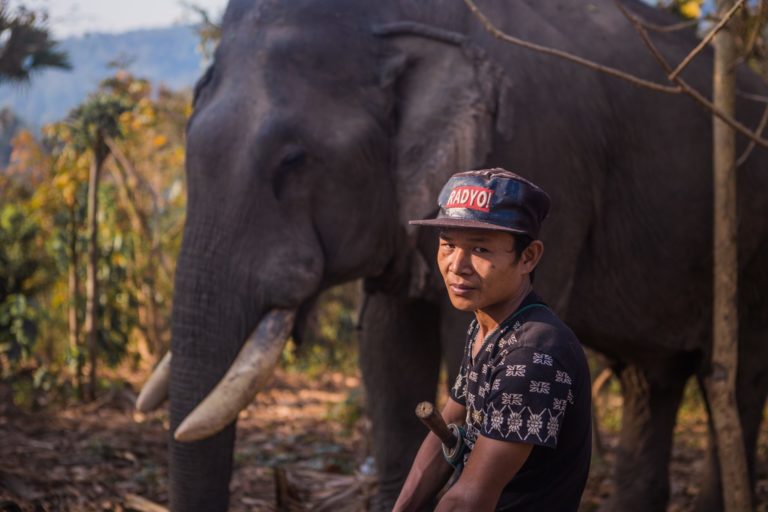
Should You Participate in Elephant Tourism?
Elephant Riding
For years, by far the most popular safari in Chitwan was on elephant back, with up to eight people on a single elephant. Elephants work up to 12 hours a day, 7 days a week, with this increasing during festivals. The surfaced roads and heavy howdah cause spinal wounds and foot injuries. Between rides, mahouts and owners make the elephants walk back to the village along hard roads which can cause foot injuries. In addition to this, they are not allowed to socialise with other elephants, which is also detrimental to their mental wellbeing. Many western companies have stopped promoting elephant rides as part of their tour packages and TripAdvisor stopped promoting them in 2016. Anyone looking to be an elephant-friendly tourist in Nepal should avoid riding an elephant at all costs.
…but what about elephant bathing?
Elephant Bathing
Elephants love water, and in nature they’ll spend hours playing in it, swimming, and cooling down from the heat in their herds. However, elephants don’t naturally engage with humans and are perfectly capable of bathing themselves.
Many tourists see elephant bathing as a ‘kinder option’. They love the thought of sitting atop an elephant whilst it playfully splashes water to cool them down from the hot weather. It seems on the surface to be more humane. Plus, you get the perfect Instagram picture.
But many camps that offer bathing experiences allow large groups of people to participate. Elephants are required to lie down, whether they want to or not, which is a really vulnerable position for them. All the while, overly excited strangers jump on their backs, yelling and screaming, which is really stressful! Many elephants are controlled with the threat of punishment if they don’t comply, and are prodded and poked to squirt water or tip tourists off their back. What should be a fun and relaxing experience for the elephant is, instead, a stress-inducing nightmare. Avoid elephant bathing if you’re looking to be an elephant-friendly tourist in Nepal.
Enter, SCIENCE. I trained as a microbiologist, and elephant bathing also poses health risks. Many Nepalese elephants in captivity have been diagnosed with Tuberculosis, which is a really nasty lung disease that humans can get too. The Tuberculosis bacteria can be breathed in through the droplets in the air after an elephant squirts water – in the same way a sneeze works to transmit a cold.
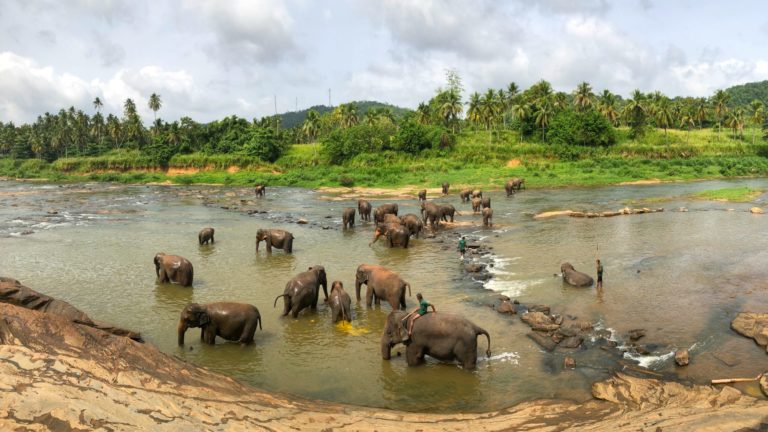
How can YOU be an Elephant-Friendly Tourist in Nepal?
Travellers who care about elephants should opt only for observational activities. However, there are many alternatives to elephant riding and bathing in Nepal. We’ve compiled a list of hands-off, elephant-friendly activities you can do when exploring Chitwan National Park. In addition to this, we’ve also included our favourite organisations working to support elephant welfare in Nepal.
Take an Alternative Safari
Jeep safari, boat safari or foot safari – all are amazing alternatives which eliminate elephants completely. If you can, try and book these tours through an operator that boycotts elephant tourism completely. See our suggestions below.
JEEP SAFARI
Riding along in an open-top Landrover for a jungle jeep safari is a comfortable and easy way to explore the magic of the jungle overland. Jeeps can cover more ground, increasing the chances of spotting rare wildlife.
BOAT SAFARI
A safari in a wooden hand-carved canoe offers an exhilarating experience and the chance to get close to crocodiles and all kinds of bird-life, as well as elehpants, tigers and rhinos cooling down from the heat.
WALKING SAFARI
A safari experience in its purest form! Nepal is one of the few places in Asia where you can trek through the jungle. Accompanied by a skilled naturalist, you can track wildlife where cars cant go. Walking in the jungle is quieter and less likely to scare off wildlife.
Experience an Observational Elephant Interaction
Tiger Tops Elephant Camp
At Tiger Tops’ Tharu Lodge and Elephant Camp, you can experience the life of mahouts and elephants, and immerse in their daily rhythm as they go about their activities. Spend the morning helping to cut the grass and weave it into kuchis, elephant food parcels. Take a walking safari in the jungle alongside elephants and their mahouts. Enjoy tea on the river bank whilst watching the elephants bathe themselves. This hands-off but very hands-on elephant experience allows you to contribute to their well-being at one one of the most reputable sanctuaries in Nepal in a completely observational way. Stay for as little or as long as you want, but we don’t think you’ll ever want to leave.
Stand Up 4 Elephants
A shorter activity, you can still enjoy the presence of these wonderful beings for a day without riding them or forcing them to engage in unnatural behaviours. SU4E offers an Elephant ‘Happy Hour’, a three hour experience where you give a working elephant a break. Instead of taking tourists on rides, the elephant gets to spend the time enjoying herself, chain free, whilst you walk alongside her. This was the option we chose whilst visiting Chitwan and you can read about our experience here or simply view the photos below to see Rupa enjoying her free time. We would recommend this activity to any elephant-friendly tourist in Nepal.
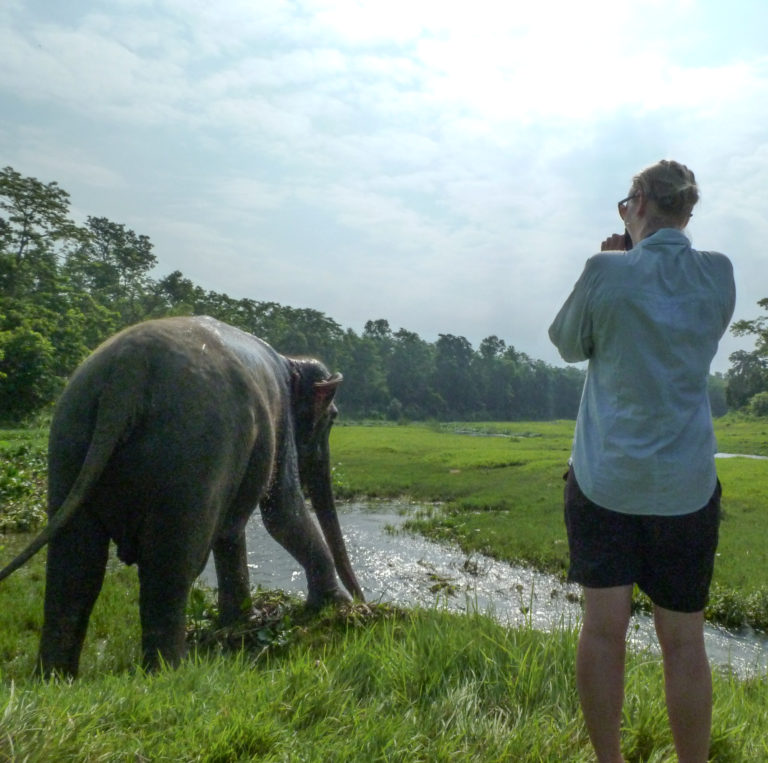
Support Eco-Lodges and Demand New Solutions
Many of the hotels in Sauraha support and organise elephant riding and bathing activities and may even own elephants themselves. As an alternative, support eco-lodges offering better solutions for the responsible tourist.
Tiger Tops Elephant Camp
If you want to put your money where your ethics are, head to Tiger Tops. Located to the western side of Chitwan National Park, they have a plethora of welfare programmes to protect and conserve the local wildlife. They also have a private elephant camp and some of the most humane and ethical elephant practices in Nepal. If you choose to stay here you can immerse yourself in the daily lives of elephants and their mahouts.
Evergreen Eco Lodge
A relatively new eco-lodge in Sauraha, Evergreen offers sustainable accommodation with a hostel-like feel. They actively encourage tourists to participate in alternative experiences which do not exploit elephants. The eco-lodge can organise a river boat or walking safari through local guides. In addition to this, they offer some amazing vegan food options
Final thoughts on Chitwan National Park
Many tourists read about elephants in Nepal and boycott Chitwan altogether.
I do not recommend this.
Without tourists visiting Chitwan, there would be mass unemployment which would particularly affect the mahouts, leading to poorer elephant treatment. This would force elephants to forage for their own food. Elephant culling might rise due to farms being invaded in their search for food. There would be no more funding for wildlife conservation and poaching levels would begin to increase.
Instead of boycotting Chitwan, funnel your money into projects and people committed to pushing for positive policies. Use your money to support local providers to offer ethical interactions that bring in tourism money without compromising animal welfare. Use your voice to actively question the conditions of working elephants. Demand better from the people of Chitwan in terms of elephant care.
The more we demand for ethical alternatives, the more ethical alternatives will be made available. Be the change you wish to see in the world.
Prefer audio? Have a listen to this podcast, where I chat to Matty of the Travel Story Society about Elephant Happy Hours and Roughing it in the Jungle
FAQs
Q: Can I see elephants in Nepal?
A: Yes, you can see elephants in Nepal. Elephants are an important part of Nepalese culture and tradition
Q: Where can I see elephants in Nepal?
A: Elephants they can be found in several national parks and wildlife reserves throughout the country, including Chitwan National Park, Bardia National Park, and Shuklaphanta Wildlife Reserve. These places offer elephant safaris and other activities that allow you to see these magnificent animals up close. However, it’s important to choose a responsible tour operator that prioritizes the well-being and ethical treatment of the elephants.
Q: Where is Chitwan national park located
A: Chitwan National Park is located in South Nepal, near the Indian border (approximately 150 kilometres (93 miles) southwest of Kathmandu). It covers an area of 932 square kilometres (360 square miles)
Q: How to get to Chitwan National Park?
A: Most travellers will go by bus. There are regular bus services from Kathmandu, Pokhara, and other major cities in Nepal to Chitwan. The journey can take between 5 to 7 hours, depending on the distance and road conditions. You can also travel by private car or taxi, which can be more comfortable but more expensive.
Q: What is elephant treatment like in Chitwan, Nepal?
A: The treatment of elephants in Chitwan can vary depending on the specific tour operator or organization that owns the elephants. However, in recent years there has been increasing awareness about the importance of ethical treatment and care of elephants in Nepal, particularly in the tourism industry. It’s important to do your research and choose a responsible tour operator that prioritizes the well-being and ethical treatment of elephants if you plan to participate in elephant-related activities in Chitwan or anywhere else in Nepal.
Want to save this post for later? Pin it on your Pinterest board!
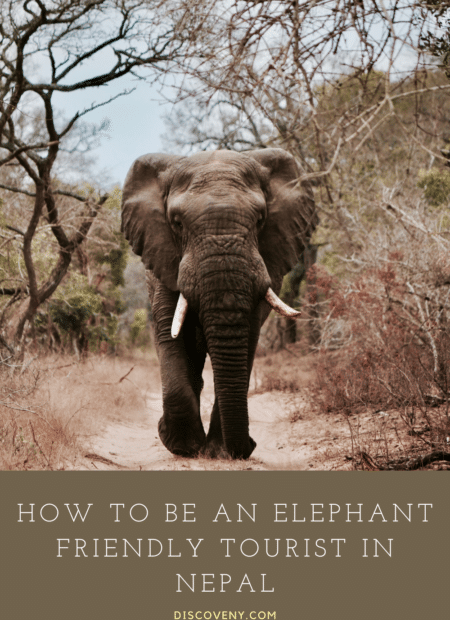
Alice
Alice is a UK travel blogger who advocates sustainable travel and being more eco-conscious on a budget. She loves coffee, her houseplants and summiting mountains.
You May Also Like
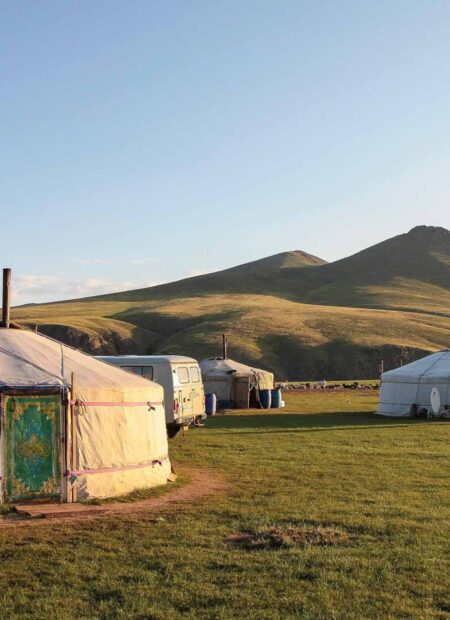
Vegan in Mongolia: How to NOT starve
January 16, 2021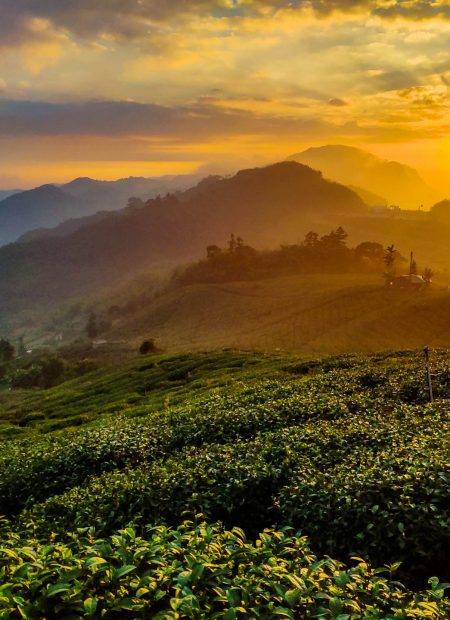
Avoid tourists in Taiwan with this hidden Tea Trail [2023]
March 18, 2023